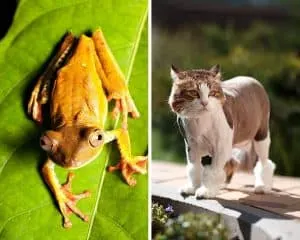 Cats eat frogs, as awful as it sounds. You can add frogs to the long list of small wildlife that your cat may have chased (and probably eaten) in the past: mice, bunnies, birds. A hopping frog might intrigue your cat more than a bird at your bird feeder in the backyard. With how frogs hop around, your cat will think it’s the next best toy they’ve found. But, do cats eat frogs?
Cats eat frogs, as awful as it sounds. You can add frogs to the long list of small wildlife that your cat may have chased (and probably eaten) in the past: mice, bunnies, birds. A hopping frog might intrigue your cat more than a bird at your bird feeder in the backyard. With how frogs hop around, your cat will think it’s the next best toy they’ve found. But, do cats eat frogs?
Yes, cats eat frogs. Cats may become sick, vomit, or lose their appetite if they eat a frog that is poisonous. Most frogs are not poisonous to cats and are safe to eat.
Even I gag at the mere thought of my cat eating a frog they found in the backyard, but it’s a sad reality of a cat that goes outside. Frogs are a little more “exotic” than the usual critters that your cat has eaten, but that shouldn’t cause you more worry. If your cat eats a frog, your cat won’t get severely sick, but they may throw up after, but who wouldn’t, right?
Do Cats Attack Frogs
Yes, cats attack frogs.
Frogs aren’t exempt from your cat if your cat goes outside and hunts small prey. Frogs may be near water, which might ward off your cat, but if frogs are hopping around in your grass, your cat might be nearby.
If you think about it, frogs aren’t much different than birds or mice. Frogs are a different animal, of course, but they’re small and move quickly just like snakes slither in the grass. If you know anything about cats, you know that sounds like something that will immediately pique your cat’s interest.
Frogs make great “cat toys” because they hop around and make noises. They’re fast and a little slippery too. Your cat may need longer to catch a frog, but once they do, it’ll be a great toy for them, unfortunately.
What Happens If A Cat Licks A Frog
Licking a frog will do more to gross you out than poison or hurt your cat.
A quick swipe of the tongue against a frog isn’t enough to hurt your cat or even the frog. If anything, your cat will probably lick up some of the slime off its back. I know that’s not a pleasant sight, but the good news is that your cat won’t be harmed by doing so.
When I was a kid, I thought the back of a frog was the most poisonous part of it – I’m not sure if this was ever backed by science or if it was just one of those crazy things I assumed as a kid – but fear not, that’s not the case.
As I said, a frog lick won’t poison your cat. The worse that will happen if the denial of kisses for your cat when you can finally wrangle them back inside the house.
What Happens If My Cat Eats A Frog
If your cat eats a frog, nothing severe will happen to your cat, but it may throw up after it eats the frog. This isn’t because the frog is poisonous but because it probably wasn’t the best choice in snack for your cat.
Frogs are not easily digestible to cats, and their stomachs will reject them upon consumption. When this happens, be ready to give your cat a break from eating their normal food and make sure they get plenty of water. Cats don’t respond well to sudden diet changes, and reducing the risk of more vomiting is essential.
Plus, if your cat is outside, your cat might have been munching on grass too.
Frogs in most regions aren’t poisonous. If you have a cat in the Amazon Rainforest, sure, you may have more grounds to worry about it being poisonous. But you’re probably not living in the remote part of the rainforest.
If your cat does snatch a frog and eat it before you get to it, don’t rush to the emergency vet. Your cat will be alright. The frog won’t poison your cat, so there’s no reason to worry. It would help if you kept an eye on your cat because you may have some vomit to clean up later in the day.
A stray cat in my own neighborhood ate a frog in our pond. We saw the cat with the frog in its mouth, its four green legs hanging out the sides. As we mourned the frog, we worried that the cat might get sick. Time passed, however, and our friendly neighborhood stray cat was perfectly fine. Too bad I can’t say the same about our frog friend.
Are Green Tree Frogs Poisonous To Cats
Green tree frogs can be poisonous to cats, but the toxin they produce is not strong enough to seriously harm or kill your cat.
When stressed, green tree frogs produce a toxin that can cause vomiting or diarrhea in your cat. And what’s the most stressful time in a tree frog’s life? Probably when they’re getting chased by your cat for a mid-afternoon snack!
Even though this poisoning might be scary for you, your cat will be fine because the toxin is neither deadly nor long-lasting. If a green tree frog poisons your cat, your cat’s body will probably resolve it within an hour. It happens so quickly that you might not even notice something is wrong with your pet or connect it to your cat, eating a frog.
Are Toads Poisonous To Cats
Frogs are not poisonous to your cat, but there is a small chance that a toad can poison your cats.
When you think of a frog, you probably think of slippery skin. Toads, on the other hand, have dry skin.
Much like frogs, the majority of toads aren’t poisonous either. If you live in Florida, Hawaii, or some states in the Southwest United States, there is a slightly higher chance that your cat may come across a poisonous toad. If you’re from one of these areas, though, you probably have an idea that there is a variety of poisonous toad nearby.
If there’s a chance your cat ate a poisonous toad, the symptoms are what you’d think from poisoning: seizures, crying, mouth sensitivity, stomach aches, and potentially death.
As scary as it may sound, you still don’t have to worry about this (minimal) potential.
How To Keep Your Cat Away From Frogs
If you have water near your home – even a small pond – there are ways to keep your cat from frog hunting.
- Keep an eye on your cat when it’s outside. If your cat is up to no good, make sure to stop your cat.
- Keep your cat indoors. If there are frogs around your small pond out front, the best way to stop your cats is to keep them in the house.
- Prevent standing water in your yard. Frogs might be attracted to large (or even small) bodies of water on your property.
- Relocate the frogs. If you have a small body of water near your property, you may only have a frog or two. You can easily move them to a different area where they’ll hopefully be much happier (and less likely to be eaten).
I think we can all agree that we would prefer if our cats didn’t eat any wildlife. There’s something particularly gross about your cat catching a slimy frog from the small pond out front. But it happens, and that’s the glory of being a cat owner. If your cat does snack on a frog family, don’t be too concerned because most frogs aren’t poisonous to your cat. Your cat’s impromptu snack won’t end with a costly visit to the emergency vet.

My name is James, and welcome to FAQCats!
Along with our team of cat owners, expert pet enthusiasts, and pet professionals, we aim to write engaging helpful, engaging content about cats. At FAQCats we strive to provide content that’s accurate and fun to read. Our team writes about everything related to cats; even the most complex of topics. Through extensive research and caring for our own fur-pals, we’re able to provide something cat owners worldwide will love. Have a look around, and leave us feedback anytime!

